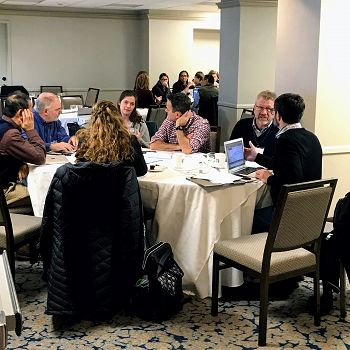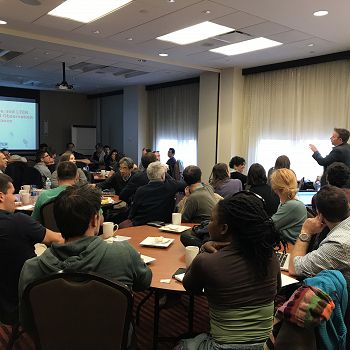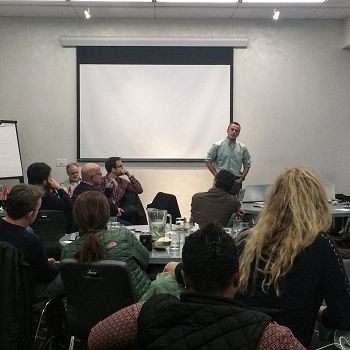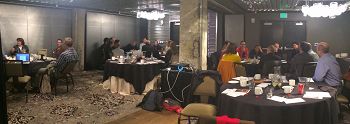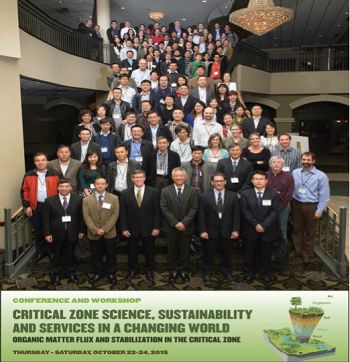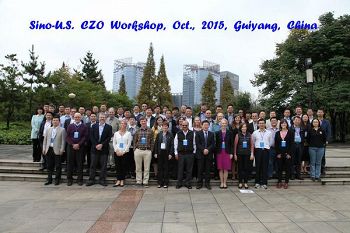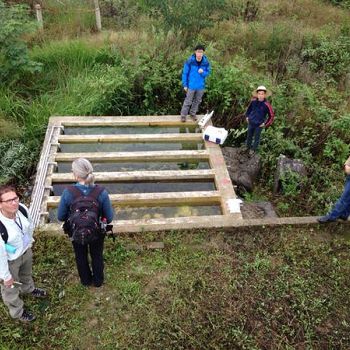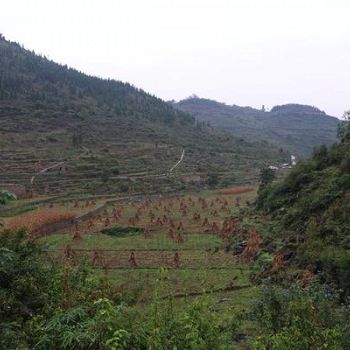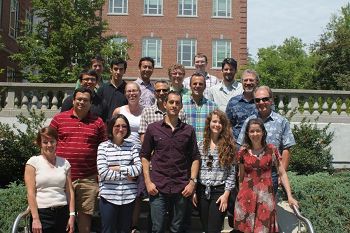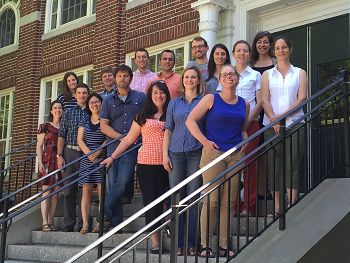Workshops
Cross-CZO science emerges from a set of common CZ science questions that can be addressed through the use of shared protocols, common measurements and an environmental gradient approach. The CZO Science Across Virtual Institutes (SAVI) project funds training workshops that focus on addressing issues relating to cross cutting questions through the collaboration of graduate students and early career scientists. This effort, within the U.S. and internationally, will help to implement a coordinated network of people, sites, tools and ideas.
In 2015, a series of eight workshops convened during summer and fall to develop and refine cross-site science questions and the common measurements required to address those questions. Workshops held in China and at the 2015 AGU annual meeting refined global goals of CZ science and promoted international collaboration between existing and developing CZOs.
International CZO Workshop 2019
December 8, 2019 - San Francisco, CA
The 5th Annual CZO International Workshop was held Sunday, December 8th, 2019 prior to the AGU Fall Meeting in San Francisco, CA. Forty registrants attended representing 8 nations and the NSF. After brief introductions around the room, US CZO National Office Director Tim White presented a brief update and overview of recent activities and opportunities from the international CZ community. Tim was followed by Nic Arnaud (Director, CNRS, France) who provided an overview of the Belmont Forum and its anticipated call in 2020 for a Collaborative Research Action (CRA) with a focus on soil and water resources in the CZ. Nic was followed by 1) updates and an open forum on various national networks of CZOs; 2) a group discussion of potential foci areas/themes in response to the anticipated Belmont Forum CRA, 3) breakout discussions based on themes and the development of potential research partnerships, and 4) a closing report out. The enthusiasm and collegiality was palpable throughout the day, as in all of the previous workshops, and we hope to identify funds to continue this workshop in coming years. Stay tuned.
International CZO Workshop 2018
December 9, 2018 - Washington, D.C.
The 4th International CZO Workshop, funded by the CZO Science Across Virtual Institutes (SAVI) project, was held on December 9, 2018, in Washington, D.C. prior to the AGU Fall Meeting. 35 participants represented CZ research networks and sites from 7 countries and included representatives from the NSF, and U.S. LTER and NEON networks. The workshop began with updates from international CZ science networks represented by Jerome Gaillardet (French eLTER - OZCAR CZO + Zone Atelier LTSER), Heye Bogena (TERENO), Steve Banwart (UK/China CZO initiative), Praveen Kumar (U.S. CZOs), and Zhiqiang Wang (China Geological Survey CZOs). A short presentation by Maria Uhle (NSF) covered future Belmont Forum funding opportunities for international collaboration. The remainder of the workshop was used to continue to develop a coordinated strategy for developing an international cooperative program in CZ research focused on societally relevant aspects of three working group themes: 1) Concentration-discharge (C/Q) relations; 2) C flux balances for soil organic matter (SOM); and 3) Measuring and predicting spatial variations in CZ architecture (ARCH). Adam Wymore (UNH, C/Q), Paul Schroder (UGA, ARCH) and Jim Tang (UCHI, SOM) led with presentations on the progress of each group in the previous year. Groups then met to coordinate and strategize a plan for 2019.
International CZO Workshop 2017
December 10, 2017 - New Orleans, Louisiana
The 3rd International CZO Workshop was held on December 10, 2017 in New Orleans prior to the AGU Fall Meeting. Building off two previously held workshops, the goal of the workshop was to further develop a coordinated strategy for advancing and funding an international cooperative program in CZ research with a focus on societally relevant aspects of three themes identified in previous workshops: 1) concentration-discharge relations, 2) carbon flux balances for soil organic matter, and 3) measuring and predicting spatial variations in CZ architecture. The workshop began with an overview by Tim White (PSU) of past SAVI workshops and upcoming opportunities. Representatives from international CZ science networks provided updates including Michael Mirtl (iLTER), Nicolaus Arnaud (French LTER: OZCAR CZO & Zone Atelier LTSER), Johan Huisman (TERENO), Andrew Binley (UK/China CZOs) and William McDowell (U.S. CZOs). The 45 workshop participants then discussed available international funding and the possible barriers and strategies of each moving forward. The workshop concluded with participants breaking into the three thematic working groups to continue strategizing for 2018.
International CZO Workshop 2016
December 11, 2016 - San Franciso, California
The 2nd CZO International Workshop was held prior to the AGU Fall Meeting on December 11, 2016 in San Francisco, CA. This workshop revolved around three research themes that emerged from the first workshop held in December 2015, the theme of which was using common measurements at an international cross-site scale. The 3 research themes are 1) Concentration-discharge (C/Q) relations, 2) Carbon flux balances for soil organic matter (SOM), and 3) Measuring and predicting spatial variations in architecture (ARCH) of the CZ. The workshop began with a short introduction by Tim White (Penn State), presentations by theme working group leaders Jérôme Gaillardet (IPGP, C/Q), Tim Filley (Purdue, SOM) and Suzanne Anderson (CU Boulder, ARCH), and an introduction to the SiteSeeker tool on CZEN.org by Sarah Sharkey (Penn State). 45 participants then broke into working groups to develop a detailed work plan for implementing field or lab science, or data synthesis involving common measurements to address each of the themes. These work plans will lead to field or lab-based “campaigns” that involve the gathering of data at multiple CZOs internationally. Each working group has established a plan to move forward in 2017.
International CZO Workshop 2015
December 13, 2015 - San Franciso, California
An International Critical Zone Workshop was held on December 13, 2015, prior to the AGU Fall Meeting, San Francisco, CA. Over 20 countries were represented by 47 scientists who met to discuss cross-site CZ questions potentially applicable at an international scale. An introduction by Tim White (Penn State) was followed by presentations to introduce established CZO Networks: Steve Banwart (U. Sheffield, SoilTrEC), Harry Vereecken (Jülich Research Centre, TERENO), Guillaume Nord (U. Joseph Fourier, RBV/Critex), Henry Lin (Penn State, China CZOs) and Suzanne Anderson (CU Boulder, U.S. CZOs). These were followed by 20 two-minute lightning talks during which speakers described the site characteristics and research focus of individual CZOs. Jon Chorover (U. Arizona) spoke of the CZ common science themes, questions, and measurements that have emerged in past CZO workshops and proposals. A room discussion led 3 working groups to break out based on themes of carbon fluxes, concentration/discharge relationships, and depth of the Critical Zone. Results from the working groups will be used to drive international collaborative research through combined resources, data, infrastructure, and the development of an expanded environmental gradient of CZOs.
Critical Zone Science, Sustainability, and Services in a Changing World: Conference & Workshop
October 22-24, 2015 – Purdue University
Purdue University hosted a conference and workshop dedicated to Critical Zone Science, Sustainability, and Services in a Changing World. Organized by the U.S.-China EcoPartnership for Environmental Sustainability, the Intensively Managed Landscapes Critical Zone Observatory (CZO), and the Working Group on Organic Matter Dynamics in the CZO Network, the gathering brought together over 150 leading researchers and their students, with 54 traveling from China, to share the latest science related to terrestrial ecosystem function and vulnerability, and to discuss and debate options for sustainable use of natural resources. The program included two regional field trips, a training workshop, 35 poster presentations and 54 oral presentations. The gathering provided an important venue for the next generation of critical zone scientists as nearly one-third of the attendees were graduate students, postdoctoral researchers, and research associates. The conference attracted broad institutional participation with 22 U.S., 1 U.K., and 16 Chinese Academic and research institutions represented. Members of the newly funded China Critical Zone Observatory Network were also in attendance and engaged in discussions to promote bi-national cross-CZO research. Learn more about this conference and workshop in the available brief summary: English version | Chinese verison.
NSF-NSFC Sino-U.S. CZO Workshop
October 5-11, 2015 - Guiyang, China
The U.S. National Science Foundation (NSF) and National Natural Science Foundation of China (NSFC) jointly convened a workshop in Guiyang, China to bring together Critical Zone (CZ) scientists from the two countries to discuss topics of common interest. The overall goal of the workshop was to: 1) begin to develop a network of collaborating Critical Zone Observatories (CZOs) in the U.S. and China; and, 2) develop a bilaterally coordinated and supported CZ science program. A further objective of the proposed bi-national program is to promote CZ science internationally, educate future leaders in global CZ science and policy, and address major societal challenges related to CZ services by leveraging diverse scientific perspectives and unique institutional resources afforded by a more fully integrated U.S.- China initiative.
A total of 35 Chinese scientists and 18 U.S. scientists spent two days in the workshop and three additional days of field trips to two CZO sites in China. Representatives from the NSFC and NSF, plus 10 students from the host institution (the Institute of Geochemistry, the Chinese Academy of Sciences), also attended the workshop and field trips. CZO sites visited were the Puding Karst Ecological Research Station in Guizhou province, and the Red Soil Ecological Research Station in Yingtan, Jiangxi province.
The resulting report highlights the scientific discussions and collaborative strategies developed through this workshop and presents some recommendations including a China - U.S. scholar exchange program in CZ science and an annual meeting between U.S. and China CZ scientists.
Cross-CZO Working Group Workshops
Working groups from the 2014 CZO All Hands Meeting submitted short proposals for workshops based on the following themes: 1) What controls CZ properties and processes? 2) What is the response of CZ structure, stores, and fluxes to climate? 3) What is the response of CZ structure, stores, and fluxes to land use change? 4) How can the understanding of the CZ be used to enhance resiliency and sustainability, and restore ecosystem services? The following five were selected to be funded by the SAVI project:
Developing the construct of Critical Zone Services
January 25-26, 2015 - UC Berkeley
By focusing on the critical zone and critical zone science, articulation of critical zone services can place many ecosystem services in a broader context. This group will develop these ideas into a peer-reviewed publication that promotes the concept of Critical Zone Services as an amplification of the rich literature on Ecosystem Services.
CZO microbial ecology intercomparison with cyberinfrastructure-enabled data synthesis
November 16-18, 2015 - Argonne National Laboratory
Many recent investigations have shown that microbial communities play a vital role in critical zone evolution and function, leading to increased focus on linking microbial metagenomic information with diverse climatic, geomorphological, hydrogeological, and biogeochemical information to improve understanding of the processes that govern earth’s critical zone and the response of the critical zone to human perturbations. Twenty-six participants having diverse expertise met to discuss needs and opportunities for synthesizing available microbial data from CZO, NEON, and related sites using emerging cyberinfrastructure tools to link relevant metagenomic and environmental data archives. Meeting attendees included 19 domain scientists (including eight early-career researchers) working at nine CZOs, five EarthCube developers, five national lab scientists, three NEON representatives, and three supercomputer center staff. The consensus of meeting attendees was that an intercomparison exercise is needed to evaluate methods for within- and across-site comparison of critical zone microbial communities, test key hypotheses about relationships between and across critical zone environments, and develop a “benchmark” dataset and sample archive to support methods development and data synthesis.
CZO Network Biogeochemistry
September 28-29, 2015 - University of California, Riverside
- Evaluating the generality of the Walker-Syer’s (1976) model of the fate of phosphorus during pedogenesis.
- Diversity and function with depth, including relative abundance of reducers vs. oxidizers, and lithotrophic vs. heterotrophic bacteria.
- Mycorrhizal impacts and influences on aboveground processes.
Concentration-discharge relationships to differences in CZ structure and function across the CZO network
July 20-22, 2015 - University of New Hampshire
The CZO network seeks to develop a mechanistic-predictive theory of critical zone structure, function and long-term evolution. One postulate is that contemporaneous hydrochemical controls over all three can be related quantitatively to dissipative solute releases measured down-gradient of reactive flow paths. These flow paths have variable lengths, compositions, and residence times, and their mixing is reflected in concentration-discharge (C/Q) relations. Hence, the C/Q-CZ working group has the collective long-term goal of better understanding concentration-discharge (C/Q) relations throughout the critical zone (CZ). The Catalina-Jemez and Luquillo CZOs organized this workshop, held at University of New Hampshire, July 20-22, 2015 and included participants representing multiple CZOs and other field sites. Papers from the workshop are being developed for joint publication in a special section of Water Resources Research.
Critical Zone Resiliency To Disturbance: A One Day Early Career Workshop To Develop Testable Hypotheses Using Common X-CZO Measurements
June 13-14, 2015 - University of New Hampshire
Scientists studying the CZ are trained in and across many traditional disciplines, such as geology, chemistry, hydrology, ecology, meteorology, pedology and many more. However, it has been difficult to engage researchers at different career stages in CZO-themed research despite concerted efforts of the National Science Foundation (NSF) and the observatories themselves. The objective of this workshop was to facilitate the development of international and cross Critical Zone Observatory (X-CZO) proposals by early-career scientists using common measurements that broadly address critical zone resiliency. The organizers-- Julia Perdrial, Diana Karwan, Adrian Harpold, and Adam Wymore, structured this workshop to facilitate the formation of small interdisciplinary working groups without a top-down assignment. This format was chosen to allow for new collaborations and ideas to form without constraints.
International CZO Workshop Photo: Sarah Sharkey
U.S.-Sino Workshop participants
Site visit during the Sino-U.S. CZO workshop, Photo: Dan Richter
Site visit during the Sino-U.S. CZO workshop, Photo: Praveen Kumar
22 U.S., 1 U.K., and 16 Chinese Academic and research institutions represented at the Critical Zone Science, Sustainability, and Services in a Changing World conference and workshop.
Participants in the Concentration-Discharge Relations cross-CZO workshop included (from top left to bottom right): Joe Mills (BC CZO), Mark Torres (USC), Chen Bao (SSH CZO), Adam Scott Ward (IML CZO), Kyle Trostle (C-J CZO), Rich Brereton (LQ CZO), Daniel Ibarra (Stanford), Pamela Sullivan (Univ. KS), Jon Chorover (C-J CZO), Bill McDowell (LQ CZO), Miguel Leon (LQ CZO), Lou Derry (CZO National Office), Kate Maher (Stanford), Hyojin Kim (ER CZO), Andres Aguirre (Cornell), Beth Hoagland (SSH CZO), and Sarah Godsey (RC CZO).
Workshop participants (from left to right): Sarah Godsey, Diana Karwan, Ben Sullivan, Lixin Jin, Adrian Harpold, Andrew Schroth, Greg Carling, Amanda Olsen, Adam Wymore, Audrey Sawyer, Ciaran Harman, Rachel Gallery, Pam Sullivan, Elizabeth Herndon, Julia Perdrial, Carol Adair.
Adam Wymore reports on a plan from concentration-discharge (C/Q) working group at the 2nd International CZO Workshop.
Andrew Binley speaks at the 3rd International CZO workshop.
The concentration-discharge working group meets to dicuss plans for 2019.
Associated Files
Sino-U.S. CZO Workshop Report
(843 KB pdf)
Report for Sino-U.S. CZO Workshop
Ecopartnership CZO Conference Summary (English version)
(769 KB pdf)
Ecopartnership CZO Conference Summary (English version)
Ecopartnership CZO Conference Summary (Chinese version)
(1 MB pdf)
Ecopartnership CZO Conference Summary (Chinese version)
Explore Further
